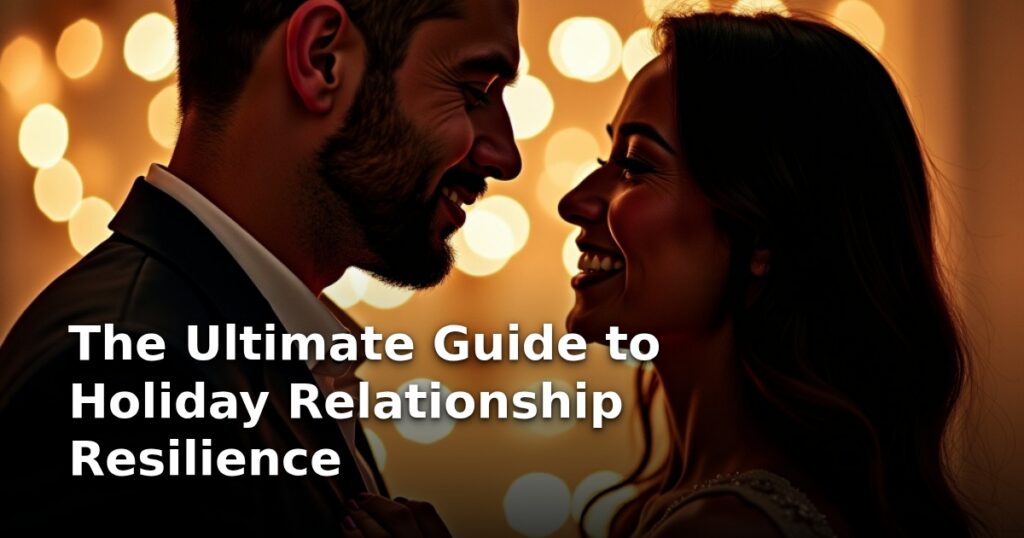The Ultimate Guide to Holiday Relationship Resilience
Executive Summary
The holiday season, often romanticized as a time of joy and togetherness, frequently introduces significant stress factors that can strain even the strongest partnerships. This ultimate guide provides comprehensive, professional holiday relationship advice designed to equip couples with the strategies needed to navigate seasonal pressures successfully. We delve into essential skills like effective communication in marriage, offer targeted solutions for managing in-law relationship stress, provide indicators for noticing when a partner might be withdrawing, and outline proactive methods for staying connected during stressful work periods. By mastering these techniques, couples can transform potential conflict into opportunities for deeper intimacy, setting a positive foundation with proactive dating advice for the new year.
Table of Contents Preview
- Introduction: The Paradox of Holiday Connection
- Fundamentals: Building Your Seasonal Relationship Toolkit
- Navigating External Pressures: In-Laws and Social Obligations
- Internal Dynamics: Recognizing and Addressing Withdrawal
- Proactive Connection: Strategies for Busy Seasons
- Advanced Resilience: Conflict Resolution and Boundary Setting
- Frequently Asked Questions (FAQs)
- Conclusion and Action Plan
1. Introduction: The Paradox of Holiday Connection
The expectation of perfect harmony during the holidays often clashes jarringly with reality. Increased financial burdens, packed schedules, travel fatigue, and heightened emotional sensitivity create a perfect storm for relationship friction. For many, this period tests the very foundation of their partnership. Therefore, understanding and applying specific holiday relationship advice is not optional—it is crucial for maintaining well-being. This guide moves beyond superficial tips, offering actionable, psychological frameworks to ensure your bond not only survives but thrives amidst the seasonal chaos.
2. Fundamentals: Building Your Seasonal Relationship Toolkit
Resilience starts with foundational skills that must be intentionally deployed when stress levels rise. Two core components are paramount: intentional scheduling and proactive conversation.
The Cornerstone of Effective Communication in Marriage
During high-stress periods, communication often defaults to transactional exchanges ("Did you buy the gift?" "What time is the flight?"). True connection requires deeper engagement.
- Scheduled Check-Ins: Implement a mandatory 15-minute, no-interruption "State of the Union" meeting daily, perhaps over coffee or before bed. Use this time to discuss feelings, not logistics.
- Active Listening Focus: When your partner speaks, focus solely on understanding their perspective, rather than formulating your rebuttal. Validate their feelings even if you disagree with the premise (e.g., "I hear how overwhelmed you feel about tomorrow's party").
- The "Soft Start-Up": Initiate difficult conversations gently. Instead of, "You never help with the decorating," try, "I'm feeling a bit stressed about the decorations; could we brainstorm a better division of labor?"
Establishing Realistic Expectations

Unmet expectations are the single greatest source of holiday disappointment. Be explicit about what you need, and equally important, what you can realistically offer. Discuss holiday budgets, gift-giving philosophies, and preferred celebration styles before the season begins in earnest.
3. Navigating External Pressures: In-Laws and Social Obligations
External demands, particularly from extended family, are significant stressors. Successfully managing in-law relationship stress requires unity and clear boundaries as a couple.
Presenting a United Front
When dealing with differing family traditions or expectations, the response must always be "we," not "I." If your spouse’s mother asks why you aren't hosting this year, your partner should respond: "We decided together that this year we would prioritize rest and visit you instead." This prevents triangulation and shows external parties that your relationship unit is solid.
Boundary Setting: The Art of the Graceful 'No'
Boundaries are essential for protecting your couple time. Identify your hard limits early on—whether it’s limiting the number of consecutive days spent with relatives or refusing to attend certain events.
- Scenario Example: If visiting your partner’s family requires a four-hour drive and an overnight stay you dread, agree beforehand that you will stay for only 48 hours, and use a code word if either partner needs an immediate exit from a conversation.
4. Internal Dynamics: Recognizing and Addressing Withdrawal
As schedules tighten and external demands mount, it is easy for partners to retreat into their own coping mechanisms. Recognizing the subtle signs your partner is pulling away is vital for early intervention.
Subtle Indicators of Disconnection
Withdrawal is often misinterpreted as anger or simple exhaustion, when it may signal deeper unmet needs or relationship anxiety.
- Decreased Intimacy: A significant drop in non-sexual physical affection (holding hands, casual touch) or meaningful conversation.
- Increased Digital Shielding: Spending noticeably more time focused on phones, work emails, or solitary activities, even when physically present.
- Emotional Distance: Responding to deep questions with short, factual answers, avoiding eye contact, or seeming preoccupied during shared activities.
Reversing the Pull-Away

If you notice these signs, resist the urge to chase or criticize. Instead, create an inviting space. Focus on low-pressure shared enjoyment. Initiate an activity you both genuinely love, regardless of the season—a favorite movie, a quiet walk, or cooking a simple meal together. This re-establishes a positive emotional connection before tackling harder issues.
5. Proactive Connection: Strategies for Busy Seasons
The holidays are often compounded by staying connected during stressful work periods, as professional deadlines frequently collide with family obligations. Connection must be scheduled, or it simply won't happen.
Micro-Moments of Connection
When large blocks of quality time are impossible, maximize the small windows available. These micro-moments build relational capital.
- The 6-Second Kiss: Research suggests a kiss lasting six seconds is long enough to register as a genuine moment of connection rather than a quick peck.
- Transition Rituals: Create clear rituals marking the shift from work/stress mode to partner mode. This might involve changing clothes, listening to a specific song, or sharing one positive thing that happened that day before discussing any stressors.
- Shared Low-Effort Joy: Find activities that require presence but minimal planning, such as watching the sunset together or listening to an audiobook while wrapping gifts.
Protecting Couple Time
If you both have demanding careers, explicitly block out "non-negotiable date nights," even if they are at home and simple. Treat these appointments with the same seriousness as a client meeting. This signals to your partner that they remain your top priority, despite the external noise.
6. Advanced Resilience: Conflict Resolution and Boundary Setting
When inevitable conflicts arise, advanced couples utilize structured resolution techniques rather than escalating arguments.
The "Time-Out" Protocol
If a discussion becomes heated or circular, utilize a pre-agreed "time-out" word or phrase. This is not storming out; it is a mutual agreement to pause. Crucially, the time-out must include a commitment to return to the discussion within a set timeframe (e.g., "I need 30 minutes to cool down, and then we will revisit this at 8 PM").
Future-Proofing: Dating Advice for the New Year

The resilience built during the holidays should transition directly into the new year. Use the lessons learned now to enhance your ongoing connection.
- Post-Holiday Debrief: Conduct a constructive review of the season. What worked well? Where did communication break down?
- Intentional Planning: Schedule your first three dates for the new year right after the holidays end. This demonstrates a commitment to prioritizing the relationship outside the pressure cooker of December.
- Shared Goals: Discuss one shared non-holiday goal for the first quarter (e.g., learning a new skill, improving fitness) to foster teamwork moving forward.
7. Frequently Asked Questions (FAQs)
Q: My partner seems fine, but I still worry about signs your partner is pulling away. What should I do?
A: Address the feeling rather than the perceived behavior. Use "I" statements: "I’ve been feeling a little disconnected lately, and I miss our deeper talks. Is there anything I can do to support you right now?" This invites dialogue without accusation.
Q: How can we manage financial stress without letting it ruin our holiday spirit?
A: Transparency is key. If debt is a concern, discuss a spending cap together before shopping. Shift focus from material gifts to shared experiences or acts of service. This preemptive planning is essential holiday relationship advice.
Q: We disagree fundamentally on how to handle my spouse’s parents. How do we maintain unity?
A: Agree that the primary allegiance is to your nuclear unit. When discussing managing in-law relationship stress, focus on defining the behavior you will model, not trying to change the in-laws themselves. For instance, you might agree that you will jointly leave any gathering after two hours, regardless of pressure.
8. Conclusion and Action Plan
The holiday season is an intensive training ground for relationship skills. By prioritizing effective communication in marriage, proactively addressing external pressures, and vigilantly watching for subtle signs of withdrawal, couples can cultivate profound resilience. True partnership is demonstrated not when things are easy, but when they are difficult. By implementing the strategies outlined here, you are not just surviving the holidays; you are investing deliberately in a stronger, more connected future, setting the stage for rewarding dating advice for the new year and beyond.
Immediate Action Plan:
- Schedule: Book your first 15-minute "State of the Union" check-in for tomorrow morning.
- Define: Identify one boundary you need to set regarding family or schedule demands this week.
- Connect: Plan one 30-minute, low-pressure activity with your partner tonight designed solely for enjoyment.
Resource List and Further Reading
- The Seven Principles for Making Marriage Work by John M. Gottman (For communication frameworks)
- Books on Nonviolent Communication (For practicing soft start-ups)
- Local relationship counseling services specializing in stress management.



